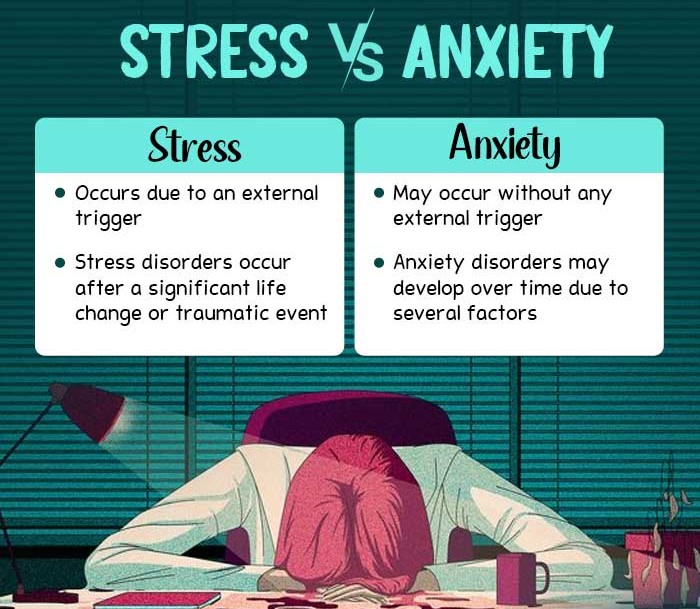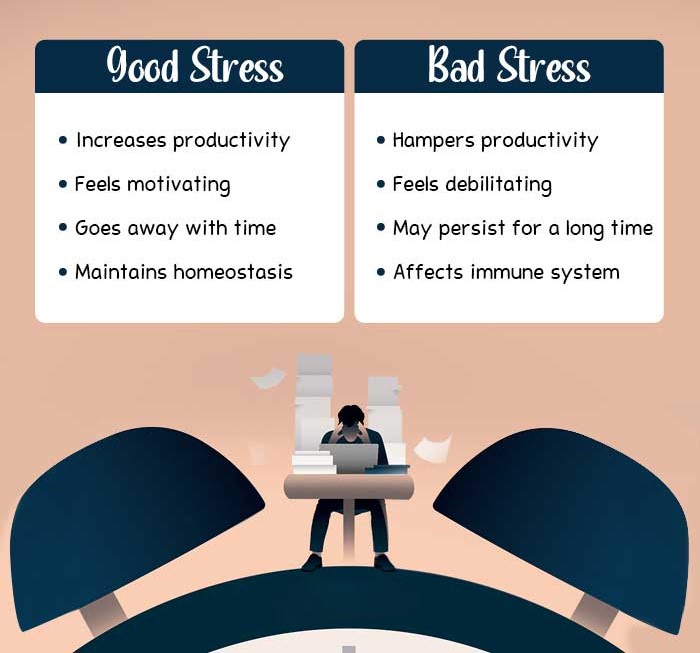Stress is a natural reaction of the human body to daily life challenges. Extreme stress can have adverse effects on an individual’s physical and psychological well-being.
What Is Stress?
Stress is a human reaction to the demands and challenges of everyday life 1 WHO. (2021, October 12). Stress. Www.who.int. Available from: https://www.who.int/news-room/questions-and-answers/item/stress . It is associated with physical tension, nervousness, frustration, and anger. Stress can occur when people go through major developmental experiences and life changes or face significant trauma.
Everyone reacts to stress in a different way; what is stressful for another person may not be that stressful for you. A range of different stressors exists that affect different people differently.
What are stressors?
A stressor is any significant situation or event that triggers your stress response. Stressors challenge the capabilities and resources 2 Monroe, S. M., & Slavich, G. M. (2016, January 1). Chapter 13 – Psychological Stressors: Overview (G. Fink, Ed.). ScienceDirect; Academic Press. Available from: https://www.sciencedirect.com/science/article/pii/B9780128009512000133 you generally use to adapt to circumstances. The physical and psychological effects of stress 3 Yaribeygi, H., Panahi, Y., Sahraei, H., Johnston, T. P., & Sahebkar, A. (2017). The impact of stress on body function: A review. EXCLI journal, 16, 1057–1072. https://doi.org/10.17179/excli2017-480 depend on the type and intensity of stressors along with related factors.
The following are the three most common stressors:
- Routine stressors are related to the pressures of work, academic performance, family issues, or any daily responsibilities.
- Sudden disruptive changes include events like losing a job, divorce, or severe illness.
- Significant traumatic events involve a major accident, assault, environmental disaster, or war where one’s life may be in jeopardy.
Signs Of Stress
The common symptoms of stress include 4 Anisman, H., & Merali, Z. (1999). Understanding stress: characteristics and caveats. Alcohol research & health : the journal of the National Institute on Alcohol Abuse and Alcoholism, 23(4), 241–249. :
- Fatigue
- Memory problems
- Mood swings
- General unhappiness
- Feelings of loneliness and isolation
- Anxiety and agitation
- Lack of motivation
- Panic attacks
- Poor judgment
- Fearful anticipation
- Procrastination
- Overdoing activities
- Frequent emotional outbursts
If you notice the above signs in you or your loved ones, it might be wise to take a break in order to cope with whatever might be contributing to the stress. Consider consulting a mental health professional if the symptoms seem too difficult to deal with.
Stress vs. Anxiety
Stress and anxiety have identical physical and emotional symptoms. However, stress usually arises from and is maintained due to specific external triggers whereas anxiety is characterized by persistent worry that does not go away even in the absence of a stressor. Anxiety is more internal than environmental although it may be maintained by some external factors.
Learn More About Anxiety Here
Both 5 Daviu, N., Bruchas, M. R., Moghaddam, B., Sandi, C., & Beyeler, A. (2019). Neurobiological links between stress and anxiety. Neurobiology of stress, 11, 100191. https://doi.org/10.1016/j.ynstr.2019.100191 stress and anxiety can give rise to clinical conditions such as PTSD and social anxiety disorder if left unaddressed.

Stress vs. PTSD
Acute or short-term stress is a natural reaction to physical and emotional changes in life. Contrarily, post-traumatic stress disorder (PTSD) 6 van der Kolk B. (2000). Posttraumatic stress disorder and the nature of trauma. Dialogues in clinical neuroscience, 2(1), 7–22. https://doi.org/10.31887/DCNS.2000.2.1/bvdkolk is a manifestation of long-term psychological stress.
Triggered by a traumatic life event, its most common symptoms include flashbacks, nightmares, severe anxiety, and uncontrollable thoughts about the event. Unlike regular stress, post-traumatic stress disorder persists in the absence of the actual trigger and can be extremely debilitating.
While you may be easily able to cope with day-to-day stress, you would require rigorous treatment in the form of therapy and medication to be able to manage PTSD.
Learn More About PTSD Here
Types Of Stress
Not all stress is bad! For ages, stress has acted as an adaptive response for our ancestors and helped them deal with threats in their surroundings. However, an excess of any emotion can be maladaptive and the same is true for stress.
Let us take a closer look at the positive and negative aspects of stress, i.e., eustress and distress.
Eustress vs Distress
The kind of stress that prepares us to face situations and motivates us to perform better is called eustress. Research 7 Bienertova-Vasku, J., Lenart, P., & Scheringer, M. (2020). Eustress and Distress: Neither Good Nor Bad, but Rather the Same?. BioEssays : news and reviews in molecular, cellular and developmental biology, 42(7), e1900238. https://doi.org/10.1002/bies.201900238 has linked eustress with high levels of concentration, productivity, positivity, and mindfulness.
Distress, on the other hand, refers to a more negative appraisal of stress 8 Encyclopedia of Stress | ScienceDirect. (n.d.). Www.sciencedirect.com. Available from: https://www.sciencedirect.com/referencework/9780123739476/encyclopedia-of-stress . It can lead to unpleasant responses and hamper a person’s ability to carry out daily tasks.
Stress can also be differentiated based on the duration of time that it has been around.

Acute stress vs Chronic stress
Acute stress or short-term stress is what we experience for a brief period of time following a significant event such as a life change or trauma. On the other hand, chronic stress 9 Mariotti A. (2015). The effects of chronic stress on health: new insights into the molecular mechanisms of brain-body communication. Future science OA, 1(3), FSO23. https://doi.org/10.4155/fso.15.21 is long-term stress that develops over a period of time due to several factors.
Chronic stress may lead to disorders such as generalized anxiety disorder (GAD).
Read More About GAD Here
Causes Of Stress
The causes of stress are myriad and largely depend on individual factors. However, some common stressors exist and these include:
1. Relationship issues
Interpersonal relationships, both within and outside one’s family can be significant contributors to stress. Research 10 Neece, C. L., Green, S. A., & Baker, B. L. (2012). Parenting stress and child behavior problems: a transactional relationship across time. American journal on intellectual and developmental disabilities, 117(1), 48–66. https://doi.org/10.1352/1944-7558-117.1.48 testifies to the fact that people experience stress-related problems due to repetitive arguments or lack of communication in the family. Other relationship problems 11 Lau, K., Randall, A. K., Duran, N. D., & Tao, C. (2019). Examining the Effects of Couples’ Real-Time Stress and Coping Processes on Interaction Quality: Language Use as a Mediator. Frontiers in psychology, 9, 2598. https://doi.org/10.3389/fpsyg.2018.02598 that may act as potential stressors include:
- Domestic and intimate partner violence
- Lack of sexual intimacy
- Marital discord
- Divorce
- Adultery, etc.
2. Financial problems
Financial burdens 12 Sturgeon, J. A., Arewasikporn, A., Okun, M. A., Davis, M. C., Ong, A. D., & Zautra, A. J. (2016). The Psychosocial Context of Financial Stress: Implications for Inflammation and Psychological Health. Psychosomatic medicine, 78(2), 134–143. https://doi.org/10.1097/PSY.0000000000000276 can take a huge toll on our psychological and physical well-being. Some financial stressors include:
- Poverty
- Loss in business
- Losing a job
- Unemployment
- Retirement, etc.
3. Career-related issues
All of us might experience various work-related problems and stress 13 Bhui, K., Dinos, S., Galant-Miecznikowska, M., de Jongh, B., & Stansfeld, S. (2016). Perceptions of work stress causes and effective interventions in employees working in public, private and non-governmental organisations: a qualitative study. BJPsych bulletin, 40(6), 318–325. https://doi.org/10.1192/pb.bp.115.050823 at some point in our lives. Some common factors related to one’s workplace that can contribute to stress include:
- Lower productivity
- Lack of appreciation
- Extreme workload
- Partiality
- Harassment and bullying
Other career-related factors such as career uncertainty, unrealistic professional expectations, lack of flexibility, and work-life balance, etc. can also lead to the onset of stress.
4. Academic pressure
Excessive academic pressure on students can also cause several psychological stress-related problems 14 Alsulami, S., Al Omar, Z., Binnwejim, M. S., Alhamdan, F., Aldrees, A., Al-Bawardi, A., Alsohim, M., & Alhabeeb, M. (2018). Perception of academic stress among Health Science Preparatory Program students in two Saudi universities. Advances in medical education and practice, 9, 159–164. https://doi.org/10.2147/AMEP.S143151 and lead to anxiety disorder, eating disorders, poor performance and career outcomes, and in extreme cases, even suicide.
Mental Health Effects Of Stress
Years of research have found various psychological effects 15 McEwen B. S. (2017). Neurobiological and Systemic Effects of Chronic Stress. Chronic stress (Thousand Oaks, Calif.), 1, 2470547017692328. https://doi.org/10.1177/2470547017692328 of stress including:
- Stress disorders (like PTSD)
- Depressive disorders
- Anxiety disorders
- Eating disorders (like anorexia, bulimia, over-eating, food binging, etc.)
- Sleep disorders (like insomnia)
- Substance use disorders (like alcoholism, drug addiction, etc.)
- Psychosis, etc.
Stress can significantly decrease our body’s ability to fight illnesses and lead to certain physical health conditions as well.
Continue Reading About The Effects Of Stress
Tips To Cope With Stress
Though stress is unavoidable, certain self-self techniques are considered extremely beneficial for coping with stress. These techniques 16 Can, Y. S., Iles-Smith, H., Chalabianloo, N., Ekiz, D., Fernández-Álvarez, J., Repetto, C., Riva, G., & Ersoy, C. (2020). How to Relax in Stressful Situations: A Smart Stress Reduction System. Healthcare (Basel, Switzerland), 8(2), 100. https://doi.org/10.3390/healthcare8020100 can reduce the adverse impact of stressors and help you live a healthy life.
Continue Reading About Stress Management
Takeaway
Stress is a natural response of our body to life challenges. Unmanaged stress can have adverse effects on people’s physical and psychological well-being. You may experience several emotional, physical, cognitive, and behavioral symptoms as a result of extreme stress.
Though there is no specific treatment for stress, psychotherapy, medication, and some stress-management techniques can help you better manage its more severe symptoms.
At A Glance
- Stress is how our body reacts when faced with certain difficult challenges and situations.
- It stimulates our body to release stress hormones that help us confront danger.
- Significant life events along with some external and internal factors can cause stress-related symptoms.
- People may experience various emotional, cognitive, physical, and behavioral symptoms when dealing with stress.
- Psychotherapy and medication are extremely effective in stress treatment.
- Regular exercise, a healthy diet, meditation, and other stress-management techniques can help one to deal with emotional pressure better.
Frequently Asked Questions (FAQs)
1. What is the difference between stress and chronic stress?
Stress may arise due to a variety of factors. Most of the time, it goes away as soon as the stressor has been averted. Chronic stress, however, is more long-term stress that develops over a period of time and may persist despite the absence of any real stressors.
2. When is stress actually good for you?
Experts suggest that an occasional amount of stress 17 Yaribeygi, H., Panahi, Y., Sahraei, H., Johnston, T. P., & Sahebkar, A. (2017). The impact of stress on body function: A review. EXCLI journal, 16, 1057–1072. https://doi.org/10.17179/excli2017-480 can actually be good for us. “Good stress”, also known as eustress is short-term stress that maintains our homeostasis, motivates us, enhances our concentration, and improves our performance.
3. How long does brain fog from stress last?
The duration of stress-induced brain fog 18 Kverno K. (2021). Brain Fog: A Bit of Clarity Regarding Etiology, Prognosis, and Treatment. Journal of psychosocial nursing and mental health services, 59(11), 9–13. https://doi.org/10.3928/02793695-20211013-01 varies from person to person. Typically, brain fog associated with stress lasts from several days to a few weeks.
4. What are the natural ways to reduce stress?
A healthy lifestyle, adequate physical activity, and availing certain stress management techniques (like yoga, meditation, therapy, etc.) are some of the natural ways to reduce stress.
5. How do you stay calm in extreme stress?
In order to calm down in extremely stressful situations, try to focus on your breathing and ground yourself by taking cognizance of your surroundings. If possible, remove yourself from the stressful situation until you feel better.
6. How do you help someone who is tired and stressed?
You can offer support to someone who is stressed by simply lending a listening ear, helping them with their challenges through financial aid or other acts of service, and encouraging them to seek therapy if they need it.











